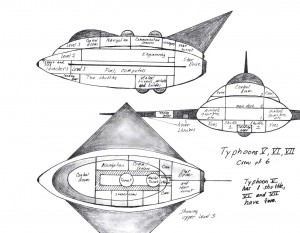On Finishing a First Draft
 I just finished Draft 1 of Commer of the Rebellion, Book 6 in the Jack Commer series. It’s too early to judge what sort of novel this is, or even if COTR will remain the final title. I’m already feeling relief at being able to forget it for a while. As far as I can tell this feels like a good novel, but I wouldn’t inflict it on anyone in its current state. I also don’t feel up to writing a synopsis yet, since the Draft 1 plot will be changing; I’ve preferred to showcase the characters on the sortmind.com Commer of the Rebellion page and in some blog posts.
I just finished Draft 1 of Commer of the Rebellion, Book 6 in the Jack Commer series. It’s too early to judge what sort of novel this is, or even if COTR will remain the final title. I’m already feeling relief at being able to forget it for a while. As far as I can tell this feels like a good novel, but I wouldn’t inflict it on anyone in its current state. I also don’t feel up to writing a synopsis yet, since the Draft 1 plot will be changing; I’ve preferred to showcase the characters on the sortmind.com Commer of the Rebellion page and in some blog posts.
Most Draft 1 chapters seem high-energy to me, but I also know there’s been a lot of deletable meandering about the workings of the SolGrid telepathic network, how it differs from the Alpha Centaurian version and how it relates to the established, merely digital SolNet network, and what’s really psychically wrong with the Martians–and how do I explain characters who had seemingly infinite powers in previous novels but who are now mentally crippled? [Drawback to characters with seemingly infinite powers: there’s no longer any conflict for the story!] But I do like the ending as it came together over the past couple weeks–it was not the feel-good, conceptual idea-fest I’d feared it might be from the plot notes I’d made in August.
I had no idea COTR would run to 414 pages, 102,188 words–but I doubt it will remain that length. I’d thought the entire book might be in the 250-page range, but a month ago, having finished twenty-nine chapters, I was surprised to see that I was at 295 pages with fourteen more chapter concepts to go, and that I might easily double the size of the novel, since any chapter concept has usually led to three or more written chapters. Characters had continued to surprise me and broaden the novel from the beginning, but my notes for these last chapters looked to be merely restating things the novel had already covered, and it was time to tighten all that up. Some new right and left brained thinking was needed.
I often gag at the commonplace assertion from writers about how the characters mystically take over the novel, etc., etc., but unfortunately it’s one of those clichés that happens to be true. And maybe I had too many characters in this novel and they all started yammering for attention like candidates at a political convention that threatened to never end. The whole point of any novel is to explore characters, but then again there’s an overall structure of meaning you have a responsibility to provide.
In addition to numerous USB backups, I also print out, in single spaced Times New Roman 10, an archival Draft 1 that would, in the event of all computers everywhere crashing, function as the ultimate backup. Rereading the print copy is a refreshing change from editing on the computer; you can circle errors but the print keeps you from charging in and digitally editing when you really need to be taking a break from all that. Since the print is generated chapter by finished chapter and I revise items in earlier chapters as I go along, the print doesn’t entirely correspond to the final first digital draft, but that’s okay. I may or may not reread this print copy shortly; I find I’m looking forward to it while at the same time resisting the urge. Draft 1 consciousness is done, and Draft 2 consciousness isn’t available yet.
One of the amusing, delicious, frustrating aspects of a rough draft is that as the pages accumulate into the two hundred/three hundred page range, I forget earlier parts of the novel except in the vaguest sense; I can navigate, sometimes with difficulty, back to earlier chapters in order to prepare for a fresh writing session relating to previous events, but I’m always surprised by what I rediscover. So rereading COTR will be somewhat like reading a novel written by someone else. I try to relax and enjoy the first read-through; this isn’t a time for wincing at awful mistakes or for making detailed revision notes.
I have just a bare outline of Draft 2 notes. But I know there’s a reason for writing this novel and that it’s not simply to Continue the Series and Throw It Out There to the Internet Wolves. Draft 2 will come at the appropriate time to investigate and clarify that reason.
Through most of COTR I was wondering whether Book 6 would be the end of the series, whether I had anything else to say about Jack Commer and his space opera universe. But ideas for a Book 7 have come up through this novel; in fact, Amav states the premise in the closing chapters. Continuing the character of the dead Jim Commer from Book 1 was a great suggestion from a reviewer, and will probably feed into Amav’s new ambitions.
However, I also have some non-science fiction writing to attend to before any Book 7. You can add psychological expressiveness to a genre novel, but that has its limits. Characters in science fiction are subject to so many outlandish experiences that trying to accurately portray their inner lives is difficult; realistically, they probably all need decades of psychotherapy instead of a quick blast off for the next mind-bending adventure. Some more literary efforts are probably needed to ground this author.
copyright 2015 by Michael D. Smith


Comments
On Finishing a First Draft — No Comments
HTML tags allowed in your comment: <a href="" title=""> <abbr title=""> <acronym title=""> <b> <blockquote cite=""> <cite> <code> <del datetime=""> <em> <i> <q cite=""> <s> <strike> <strong>